If you are struggling to repel wasps from your home or garden, you know that this is no easy task. Driving wasps away is especially difficult if you want to do so in a natural manner. Fortunately, certain essential oils can help to repel wasps.
The best essential oils to repel wasps include peppermint, clove, sage, ylang ylang, wintergreen, citronella, geranium, and anise. The best wasp repellent is a mix of essential oils (clove, geranium, and lemongrass) and it totally blocked the attractions of wasps. Full details are in this post.
Since peppermint oil is an especially effective essential oil for repelling wasps, there is also a peppermint oil recipe that you can use to get rid of wasps.
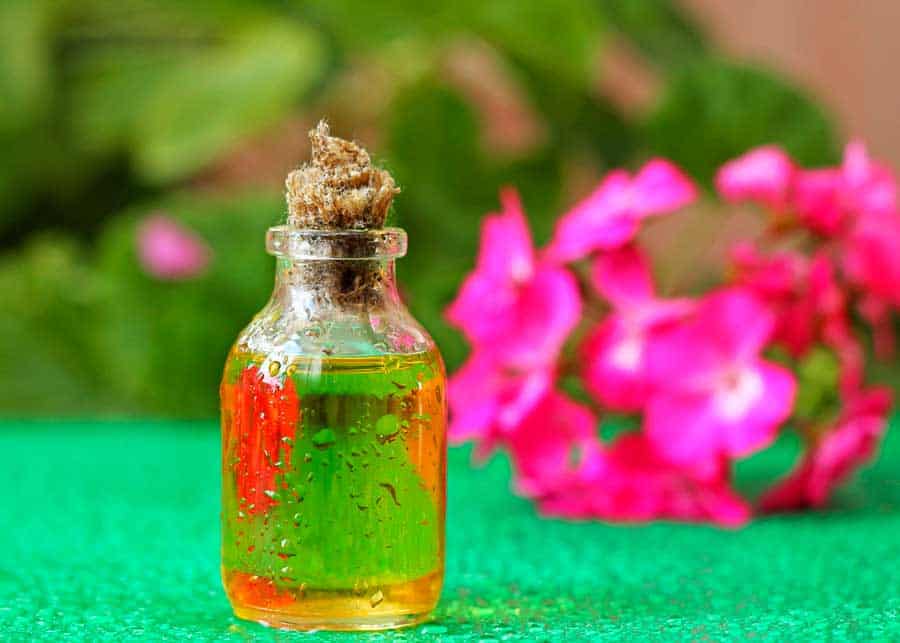
Table of Contents
What Essential Oils Repel Wasps?
The essential oils listed below efficiently repel wasps. Following the list, you’ll find the mix of essential oils that worked best for researchers at completely repelling wasps.
1. Clove
This essential oil comes from the dried flower buds of the clove tree. Besides being a great wasp deterrent, clove oil has antimicrobial properties and it can help relieve muscle pain or toothache pain.
Mix clove with geranium and lemongrass essential oils for best results. A mixture of clove with geranium, lemongrass, and rosemary will also repel wasps very well.
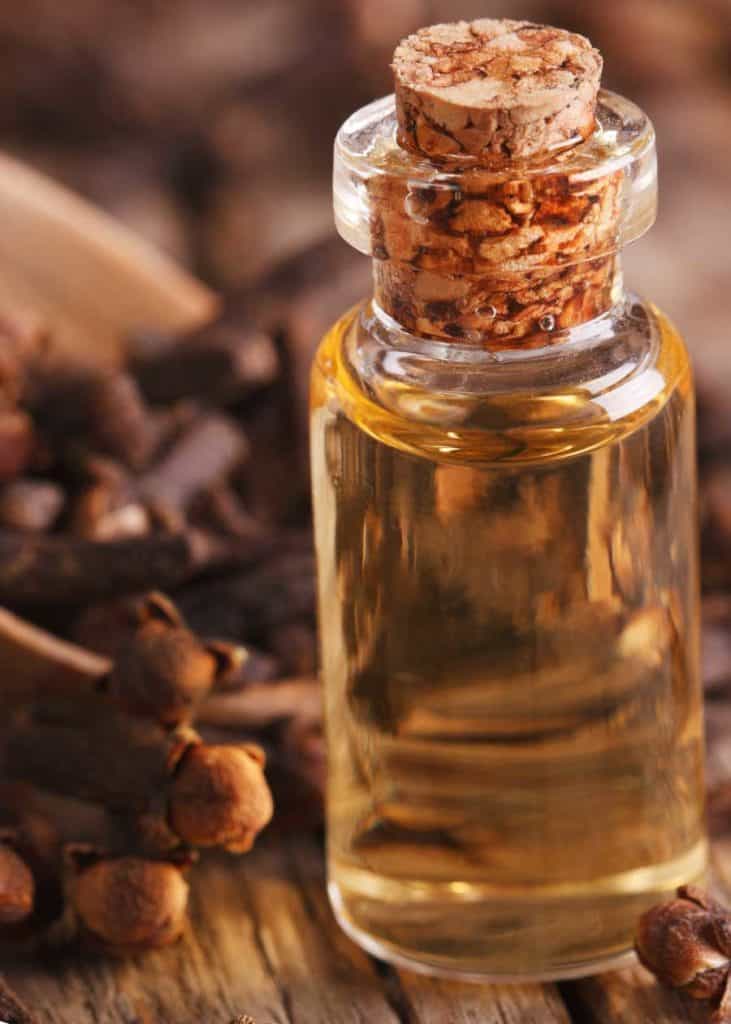
2. Pennyroyal
Pennyroyal essential oil comes from the pennyroyal plant. Historically, it has been used to treat everything from breathing issues to menstrual cramps.
However, you should be especially careful when handling this oil since it is highly toxic if you do not dilute it significantly.
Pennyroyal oil is effective pest control, thanks to the presence of pulegone and menthone.
3. Lemongrass
Lemongrass essential oil comes from a useful grassy plant that plays a role in medicine and cuisine across the world. It has a few health benefits, including helping digestive issues and anxiety.
This oil also has antibacterial and antimicrobial properties. Mix clove with geranium and lemongrass essential oils for best results.
4. Ylang ylang
The vibrant and floral ylang ylang essential oil comes from a yellow flower native to parts of Asia and Australia.
In addition to repelling insects, this essential oil can kill bug larvae. People also use ylang ylang to boost their mood, lower blood pressure, and help with skin issues.
5. Spearmint
Wasps dislike all types of mint. So, in addition to using mint essential oils, you can also deter wasps by planting spearmint around your garden.
Spearmint is a perennial herb that grows around the world. It is one of the sweeter-smelling mints. Mint also helps relieve digestion problems, stress, blood sugar, and joint pain.
6. Peppermint
Peppermint essential oil is one of the most effective oils for getting rid of wasps and other insects. It comes from the peppermint plant which is a hybrid between spearmint and winter mint.
Some of the main chemicals in this oil are menthol and menthone.
7. Wintergreen
Wintergreen oil comes from the wintergreen plant. However, it may sometimes also be a synthetic methyl salicylate, which is the primary chemical in natural oil.
This oil can often be found in repellents and insecticides. Unlike other essential oils on this list, wintergreen oil is more often an insecticide.
8. Sage
You may be familiar with sage as a delicious ingredient in the kitchen, but it can also make a useful essential oil. This herb has uses in several traditional medicine systems.
It has been used to treat coughs, depression, and inflammation. Sage is an effective insect repellent, especially in combination with other oils.
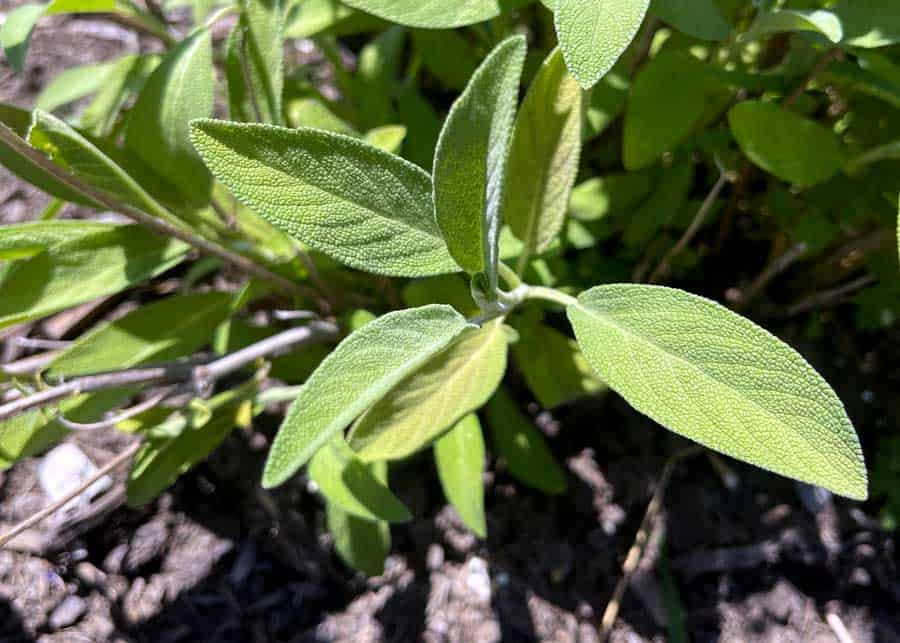
9. Rosemary
Rosemary is another herb known for its versatile seasoning uses. The oil derived from this herb also has many medicinal uses.
Besides repelling wasps, this oil can also repel other bugs that may be harmful to your garden. Rosemary oil is also one of the most effective oils at repelling virus-carrying mosquitos and ticks.
10. Thyme
In addition to being a delicious kitchen herb, thyme is also antifungal, anti-inflammatory, and antibacterial.
The strong flavor that makes it a popular herb also makes it an effective wasp deterrent.
11. Lavender
You may know lavender as a relaxing and intoxicating scent in candles, lotions, and desserts. However, it can also be a powerful deterrent to insects.
In addition to driving away wasps, this oil can also scare away mosquitos, fleas, spiders, ticks, and other insects. This oil is especially great for driving insects away from your clothing.
12. Geranium
Geranium oil comes from the leaves of the geranium plant. While this oil works as an element of perfumes, it can also be a formidable insect repellant.
Mix geranium with clove and lemongrass essential oils for best results. Adding some rosemary essential oil to the mix will also be effective.
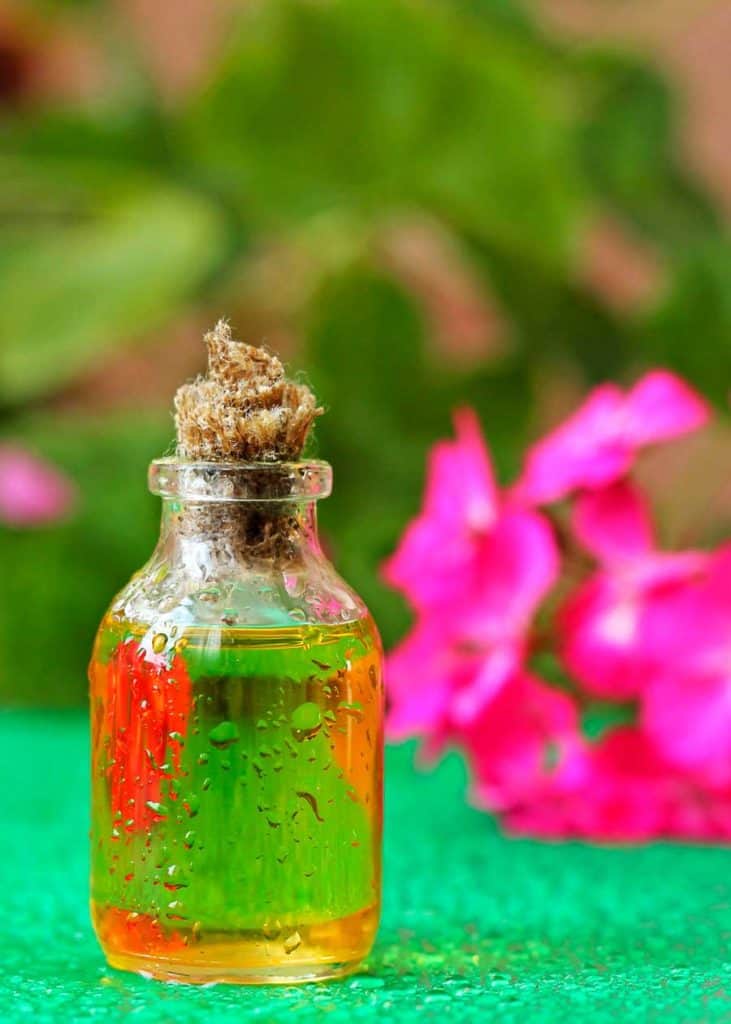
Planting many of these plants and flowers also serve to keep wasps away. Learn about wasp repellent plants.
13. Patchouli
Patchouli oil is a popular component of perfumes and medicine. It can help with everything from depression to dandruff.
This oil is also one of the most effective essential oils when it comes to deterring insects.
14. Citronella
Citronella is perhaps one of the most well-known ingredients in insecticides and insect repellants. The oil can also treat parasitic infections and promote wound healing.
Citronella also works well when used in conjunction with vanillin.
15. Chamomile
Chamomile is a small white flower that is known for its presence in calming teas and multifunctional oils.
This oil is effective thanks to its active ingredient of chamazulene. Besides repelling wasps, these oils can also help heal insect stings.
16. Fennel Seed
Just like all parts of the fennel plant, fennel seeds are very potent in terms of scent and flavor.
The oil derived from those seeds is even more powerful. It is known for its medicinal properties and its ability to deter insects.
17. Anise
If you are someone who does not enjoy the licorice-like flavor of anise, you probably know how a wasp feels as it smells the plant’s pungent odor.
Other than wasps, this oil also drives away other insects, such as aphids.
This oil has many medicinal purposes, including reducing inflammation and helping with gastrointestinal distress.
Mixing Essential Oils for Best Results
In the study cited above, they found the best results by mixing a combination of essential oils into a swamp water mix for repelling wasps.
Two essential oil mixtures – 3EO-mix (clove, geranium and lemongrass) and 4EO-mix (clove, geranium, lemongrass and rosemary) – totally blocked the attraction of vespid workers.
Peppermint Oil Wasp Repellant Recipe
Aside from wondering what essential oils repel wasps, you may also be asking yourself how to use said oils.
There are a few different ways that you can use peppermint and other essential oils to keep wasps away. If you want to keep wasps away from your patio or garden, you can make a sprayable mixture. You can also make a recipe to apply to your clothes or skin.
To make a peppermint oil wasp repellent:
- Mix equal parts peppermint essential oil, thyme essential oil, and rosemary oil in a spray bottle. Start with 10 drops of each and add more as needed.
- Dilute the oils with water.
- Spray garden, patio, window sills, and other areas to repel wasps.
- Since this solution will only repel wasps, you will need to add castile soap to the solution if you want to kill wasps or hornets.
Essential Oil Safety
Essential oils are a powerful tool for repelling wasps. However, those same oils can also be toxic to humans and animals.
There are a few easy steps that you can take to handle essential oils safely.
- Essential oils should always be diluted with a carrier oil before applying them to your skin.
- Keep essential oils away from your eyes and face.
- Keep essential oils away from food.
- Always look for any concerning symptoms in children and pets after you use essential oils in their vicinity.
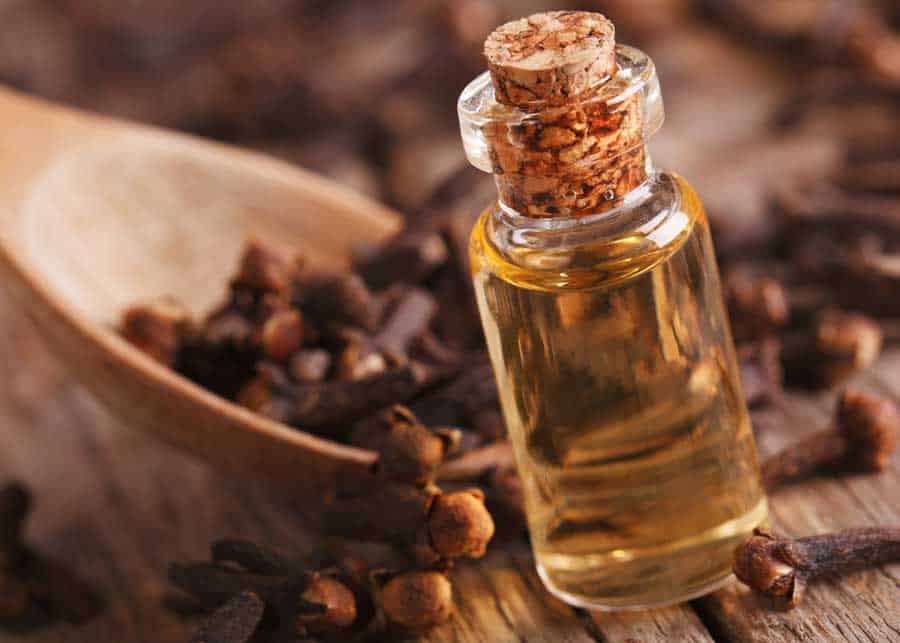
Your Turn
Driving wasps away with natural materials may be easier than you think. All you need to do is use the right essential oils in areas where wasps like to hang out. You can make a sprayable mixture and keep it handy at all times.
- About the Author
- Latest Posts
Bryan Haines is a co-founder and writer at The Buginator. And is working to make it the best resource for taking back the outdoors from biting, stinging pests.
He also blogs about travel at Storyteller.Travel and photography at Storyteller Tech. Bryan is a partner at Storyteller Media, a publishing company he runs with his wife, Dena.

Gina
Monday 22nd of August 2022
Great site, thank you. I will be sure to share
Bryan Haines
Monday 29th of August 2022
Thanks Gina!